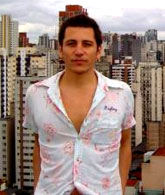Filmmaker Benito Montorio discusses shooting in the crime-ridden city of São Paulo and sacrificing his personal safety for the sake of capturing the truth while making “Ransom City.”
Question:
In “Ransom City,” we see São Paulo, Brazil as a city where crime is out of control and a person is kidnapped every three days. Did you have any hesitations about shooting in such a dangerous location? And what measures did you take to protect yourself during production?
Answer:
If you worried too much about the dangers, you wouldn’t make the film. I often spoke to my crew about safety, but most of the time it was about following my instincts. I pulled out of certain situations because it just didn’t feel right. The bottom line though is that if you are making a film about kidnapping, you can’t expect to capture the reality of it if you don’t get close. I guess you have to earn the right to some pictures.
Not sure I would go on a kidnapping raid again, though!
Question:
The subjects featured in “Ransom City” are archetypes of good and bad: the handsome cop who catches “bad guys,” the remorseless kidnappers, and the young soccer star whose mother becomes the victim of a kidnapping. Can you describe the process of finding these characters, and discuss how they responded to the idea of appearing in the film?
Answer:
It is interesting because I see it in a totally different way. What interests me is how the good guy could so easily have become the bad guy, and vice versa. I don’t think they are black and white at all.
To me, the big kidnapper Celio Marcelo da Silva comes across as cool, clever, and calculated. Wagner the cop is a good guy, but obviously has to walk a tightrope. As he once told me, “Being a policeman in Brazil is like wearing a white suit and having to walk through a big muddy puddle everyday. At the end of each day you are then expected to return with a perfectly white suit.”
Also, the soccer star admits that only soccer stopped him getting into trouble as a youngster.
If we take the three main characters, all three came from the same place in society and all tried to escape. One became a policeman, one a soccer player, and another a criminal. In fact, at the very end of the film, Celio the kidnapper actually says that he always wanted to be a doctor.
I am interested in how and why people take a certain path and the influencing factors: opportunity, culture, personality, identity, etc.
What was also really interesting is that in Brazil all the kids see soccer as a way out. Unfortunately, as Dona Maria’s soccer school shows, crime becomes the only alternative for most.
Question:
All major cities have upscale neighborhoods and slums. But in São Paulo, the wealthiest neighborhoods are developed right next to the poorest favelas. In making the film did you see a correlation between this and the ballooning crime they are experiencing?
Answer:
I haven’t been anywhere else in the world (apart from South Africa) where the difference between rich and poor is so visually evident. If you have a large group of people who are very poor (many people in the favelas live in shacks with no running water and heating) living next door to people who have swimming pools, I think it is pretty obvious they are going to be angry.
Not only do many decide to balance this inequality by criminal means, but also the injustice of a society discriminating against them actually (for them) justifies their actions. The kidnappers we interviewed believed they were fighting a cause, a war.
Question:
In the film, the head of the anti-kidnapping squad describes an urban war between the cops and the gangs. While you were in Brazil, did you see anything that indicated a solution was possible?
Answer:
Well, inequality and poverty are the big underlying problems in Brazil, but in that specific scene it was also to do with the fact that the criminals see the cops as another part of a wider corrupt authority only interested in keeping the rich rich and the majority down.

